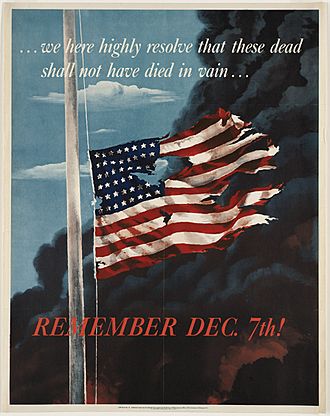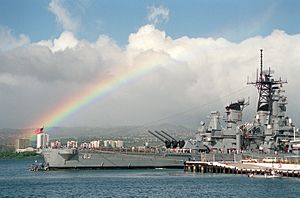National Pearl Harbor Remembrance Day facts for kids
Quick facts for kids National Pearl Harbor Remembrance Day |
|
|---|---|

Office of War Information poster memorializing the Pearl Harbor attack (1942)
|
|
| Date | December 7 |
| Frequency | Annual |
National Pearl Harbor Remembrance Day, also known as Pearl Harbor Day, is a special day in the United States. Every year on December 7, we remember and honor the 2,403 Americans who died. They were killed during a surprise attack by Japan at Pearl Harbor in Hawaii. This attack happened on December 7, 1941. The very next day, the United States declared war on Japan. This meant the U.S. officially joined World War II.
In 1994, the United States Congress decided that December 7 would be National Pearl Harbor Remembrance Day. President Bill Clinton signed this law on August 23, 1994. On November 29, 1994, President Clinton officially announced the first observance of this day.
On Pearl Harbor Day, the American flag is flown at half-staff until sunset. This is done to honor those who died in the attack. Pearl Harbor Day is not a federal holiday. This means government offices, schools, and businesses stay open. However, some groups might hold special events. These events remember the people who were killed or hurt at Pearl Harbor.
Contents
The Attack on Pearl Harbor
On Sunday morning, December 7, 1941, the Imperial Japanese Navy Air Service launched a surprise attack. They targeted the Naval Station Pearl Harbor near Honolulu, Hawaii. At the time, the United States was neutral in the war.
The attack killed 2,403 Americans and injured 1,178 others. Four U.S. Navy battleships were sunk. Four other battleships were badly damaged. Several cruisers, destroyers, and a minelayer also suffered damage. Many aircraft were destroyed or damaged on the ground.
What Happened After the Attack?
Within hours of the Pearl Harbor attack, Canada declared war on Japan. It was the first Western nation to do so. On December 8, the United States officially declared war on Japan. This brought the U.S. into World War II on the side of the Allies. President Franklin D. Roosevelt spoke to Congress after the attack. He famously called December 7 "a date which will live in infamy."
Pearl Harbor Historic Sites
Many important memorials and museums are located at Pearl Harbor and nearby Ford Island. They help us remember the events of that day.
- The USS Arizona Memorial is a marble memorial. It sits over the sunken battleship USS Arizona. This memorial honors the 1,177 crew members who died on the Arizona. It was dedicated on May 30, 1962. The memorial remembers all military personnel killed in the attack. Visitors can take boat tours to the memorial from the visitors center.
- The USS Oklahoma Memorial remembers another battleship that was sunk. The Oklahoma lost 429 men on December 7, 1941.
- The USS Utah Memorial honors the crew of the USS Utah. This ship was a former battleship converted into a target ship. It was also sunk during the attack. A memorial for the 58 crew members who died was dedicated in 1972. The Utah, along with the Arizona, is a National Historic Landmark.
- The USS Bowfin Submarine Museum and Park is next to the USS Arizona Memorial Visitors Center. It remembers an American submarine that sank many ships in World War II.
On Ford Island, which is an active military base, public access is usually limited to approved tours.
- The USS Missouri Memorial is also there. The surrender of Japan that ended World War II happened on the deck of the USS Missouri.
- The Pacific Aviation Museum Pearl Harbor is another important site on Ford Island.
Honoring Pearl Harbor Heroes

In 1990, Congress created the Pearl Harbor Commemorative Medal. This medal is also known as the Pearl Harbor Survivor's medal. It was given to members of the U.S. Armed Forces. To receive it, they had to be in Hawaii on December 7, 1941. They also had to be involved in fighting during the attack. Civilians who were killed or injured in the attack could also receive the medal. Later, the rules were changed slightly. Any person present in Hawaii on that day who fought against the Japanese attack could receive it. There was a limited time to apply for this award, and it is no longer given out.
 | Lonnie Johnson |
 | Granville Woods |
 | Lewis Howard Latimer |
 | James West |

